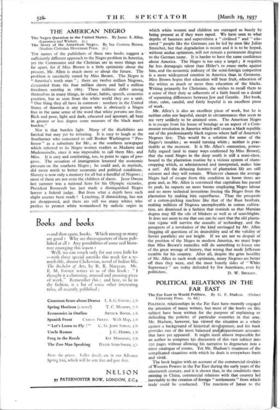THE AMERICAN NEGRO The Story of the American Negro. By
Ina Corinne I3rown. (Student Christian Movement Press. 5s.) THE names of the publishers of these two books suggest a sufficiently different approach to the Negro problem in America, yet the Communist and the Christian are in most things not far apart, for if Miss Brown is a little optimistic about the present, .Mr. 'Allen_ is much more so about the future. The problem is succinetly stated by Miss Brown: The Negro is "America's tenth man " ; there are twelve million Negroes, eescended from the four million slaves and half a million freedmen existing in 1865. These millions differ among themselves in many things, in colour, habits, speech, economic position, but as seen from the white world they are a unit., "One thing they all have in common : nowhere in the United States of America is any person who is obviously a Negro free in the same sense of the word that white persons are free. Rich and poor, light and dark, educated and ignorant, all bear in greater or less degree some measure of the black inan's burden."
Nor is that burden light. Many of the disabilities are farcical but may yet be irritating. It is easy to laugh at the Southerner who consented to call Booker Washington "Pro-. lessor" as a substitute for Mr., at the southern newspaper which referred to its Negro women readers as .Madame and Mademoiselle, since it was impossible to call them Mrs. and Miss. It is easy and comforting, too, to point to signs of pro- gress. The cessation of immigration lessened the economic pressure on the southern Negro ; he could and, in myriads, did move north to better economic and political conditions. Slavery is now only a memory for all but a handful of Negroes ; most of them are not even the children of slaves. Jesse Owens last summer was a national hero for his Olympic victories. President Roosevelt has just made a distinguished Negro lawyer a federal judge. .But from what a depth have such slight ascents been made ! Lynching, if diminishing, has not yet disappeared, and there are still too many whites who profess to protect white womanhood by sadistic orgies in which white women and children are outraged as basely by being present as if they were. raped. We have seen to what
depths of baseness and superstition a " civilised " and " edu- cated " people hie the Germans can be led by men like Julius
Streicher, but that degradation is recent and it is to be hoped, without undue optimism, will not remain a permanent disgrace to the German name. It is harder to have the same confidence about America. The Negro is too easy a target ; it requires far less demagogic talent than Hitler's to rouse mobs against
him, and the economic jealousy of the semi-foreigh "competitor is a more widespread emoticin in America -Min. in Germany. Miss Brown hopes that education will bear fruit, education of
the whites as much or more than education of the blacks. Writing primarily for Christians, she wishes to recall them to a sense of their duty as adherents of a faith based on a denial of separating differences between Jew and Gentile. Her book, clear, calm, candid, and fairly hopeful is an excellent piece of work.
Mr. Allen's is also an excellent piece of work, but he is neither...calm nor hopeful, except in circumstances that seem to me very unlikely to be attained soon. The American Negro is to escape from his house of bondage as an aspect of a Com- munist revolution in America which will create a black republic out of the predominantly black regions where half of America's Negroes live. This would be a solution for some of the Negro's troubles ; so would turning white ; neither is prac- ticable at the moment. It is Mr Allen's contention, power- fully argued (and in many ways confirmed by Miss Brown), that the rural Negto in the deep south is still a semi-slave, bound to the plantation routine by a vicious system of share- cropping which, as administered and interpreted, makes him a serf. All the debasing features of plantatioh life are still existent and they will remain. Whatever chances the average Negro had of escape from this condition in boom times are gone and, as Mr Allen is convinced that capitalism has passed
its peak, he expects no more booms employing Negro labour and no more technical inventions freeing the Negro from the plantation by making him superfluous. Thus the prospects of a cotton-picking machine like that of the Rust brothers, making millions of Negroes unemployable in cotton cultiva- tion, are rlicinissed in a fashion that reminds us that Marxian dogma may fill the ride of blinkers as well as of searchlights.
It does not seem to me that one can be sure that the old planta-
tion rigime will survive the assaults of technology, and the prospects of a revolution of the kind envisaged by Mr. Allen
(begging all questions of its desirability and of the validity of Soviet parallels) are not bright. If we are not to despair of the position of the Negro in modern America, we must hope that Miss Brown's remedies will do something to lessen one of the great wrongs of history, that wrong that made Jefferson tremble for his country. After all despite the grim hostility of Mr. Allen to such weak optimism, many Negroes are better off than they were, mut the most beastly sides of "White Supremacy" are today defended by few Americans, even by




































































 Previous page
Previous page